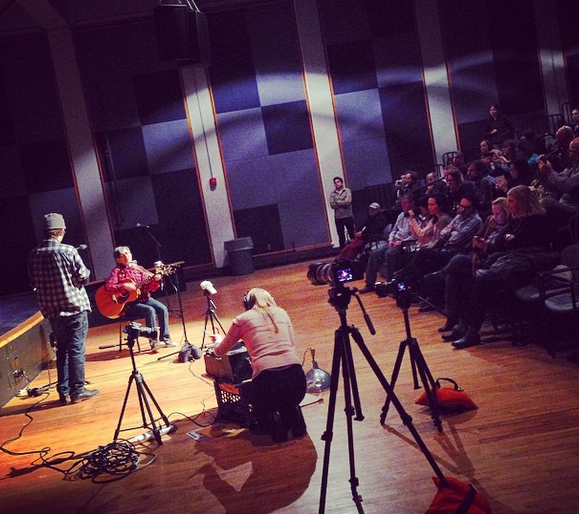
Joe Jack Talcum at International House | Photo by John Vettese
The International House building is being sold; future of its arts programming is unclear
The towering International House building at 37th and Chestnut has long been home not just for students from around the world attending college in Philadelphia, but for a vibrant array of arts and cultural programming. Their events calendar runs the gamut from film screenings to musical performances by traditional ensembles like the Liberian Women’s Chorus for Change, experimental artists like J.G. Thirwell and Zola Jesus, and left-of-center multimedia events like The 78 Project’s direct-to-acetate taping of a Joe Jack Talcum performance.
This week, however, the long-running institution announced plans to vacate and sell the property, and “set a new course for the organization.” As president IHP president Josh Sevin and board of trustees chair Ludo Scheffer wrote in a joint announcement:
International House Philadelphia has a proud legacy as a pioneering nonprofit that has made a difference in the lives of tens of thousands of international students and scholars who have come to Philadelphia to advance their studies. It has expanded the perspectives of an even greater number of local residents via programming celebrating a range of global cultures and artforms. But in recent years, IHP has been forced to reexamine its role as a hub for international students and cultural programming in a changing Philadelphia.
Though its current home was erected in 1970, The International House as an organization has existed since 1908 — a time when, as Sevin and Scheffer put it, “housing market discrimination against foreign-born students was the norm in Philadelphia, along with concerns about safety and social isolation.” That has changed, as has the programmatic gap the organization was hoping to fill with globally-minded events like its Lunar New Year celebrations, or performances by groups like Tuvan throat singers Yat-Kha.
In an interview with the Philadelphia Inquirer‘s Jacob Adelman:
Sevin said the aging 37th and Chestnut Street building, which has become crushingly expensive to maintain, faces tough competition for residents from the new housing options rising nearby that are eager to welcome international students. Meanwhile, he said, the types of cultural celebrations that were once the International House’s specialty are now held citywide.
“The challenges we face organizationally are a result of progress toward our larger goals,” Sevin said this week.
Sheffer was more direct in the interview with Adelman, saying “We kind of accomplished our mission.” But what does that mean for the year-round programming that International House Presents puts on? The announcement said that IHP plans to continue its Lightbox Film Center series through the end of 2019, and in the Inquirer interview, Sevin spoke of collaborating with outside groups to find new homes for its cultural event series. There are no specifics at this point, but Sevin and Scheffer see the organization they built continuing as a connector between disparate arts groups. From the announcement:
Our vision for IHP’s next phase is to play a different kind of international hub role in which we provide shared space, services, and support for organizations and individuals working to make Philadelphia more welcoming and globally connected. This will mark the start of a new and different chapter for IHP, and we will have more to share about this new direction in the coming months.
Here at The Key, we’ll be eagerly awaiting word of the next chapter in IHP’s story; it is difficult to overstate the significance that the building and organization’s unique, eclectic events had and continues to have to the Philadelphia cultural community, from decades of hosting events at the Philadelphia Film Festival and its offshoots, all the way back to a glorious Sun Ra performance on its rooftop, documented by filmmaker Robert Mugge in the 1980 documentary A Joyful Noise. That doc is streaming on Netflix now; watch the trailer below.
https://www.youtube.com/watch?v=HHjeIh6zIRA